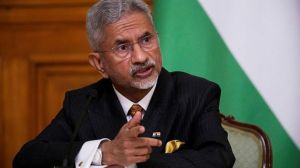Stay updated with the latest - Click here to follow us on Instagram
Cyber Cell of Chandigarh: Police gets 102 complaints since November 9
AS CASHLESS transactions have increased after demonetisation, so have fraudulent online transactions, going by the figures of the Cyber Cell of the Chandigarh Police. Post-demonetisation, while the cell registered five criminal cases pertaining to cyber frauds, it received a total of 102 complaints. Out of these complaints, 55 pertain to ATM frauds and 57 to […]
 The Cyber cell of Chandigarh Police in Sector 17. Source: Jaipal Singh
The Cyber cell of Chandigarh Police in Sector 17. Source: Jaipal Singh
AS CASHLESS transactions have increased after demonetisation, so have fraudulent online transactions, going by the figures of the Cyber Cell of the Chandigarh Police.
Post-demonetisation, while the cell registered five criminal cases pertaining to cyber frauds, it received a total of 102 complaints. Out of these complaints, 55 pertain to ATM frauds and 57 to fraudulent transactions through debit cards. These 102 complaints are part of a total of 300 cyber crime complaints received by the cyber cell from November 9, 2016, till January 10, 2017. The remaining complaints pertain to sexual harassment on the Internet, stalking and hacking of e-mails.
Inspector Harinder Singh Sekhon, incharge, cyber cell, Chandigarh Police, says, “Post-demonetisation, we have become more careful about online fraudulent transactions. The number of such complaints has increased. A recent case pertains to a fraudulent transaction through Paytm account of a government employee, Gagandeep Kaur, who lost Rs 18,000 after sharing her password and OTP with an unidentified caller. The accused was identified as Yogesh Partap Singh of Delhi and arrested. It was the first reported case in this region comprising Punjab, Haryana and Himachal when someone lost money through e-wallet post-demonetisation.”
In another debit card fraud, a local computer teacher, Tejinder Singh, of Sector 56, did not share his confidential details with anybody but fraudsters managed to do a shopping worth Rs 39,000 with his debit card. Police investigations revealed that the debit card was used to shop in Los Angles, United States of America.
Tejinder says, “There was negligence on the part of the private bank that issued the debit card to me. I deposited a cheque in my account on January 6 and in the next four hours, about 13 transactions were made from my account and fraudsters withdrew Rs 39,000 from my account. I did my best to block my account. But before the bank authorities blocked my ATM card, half the amount in my account was already gone.”
“When I approached police,” says Tejinder, “They first told me that I might have unknowingly revealed my password and OTP to some strange caller. But later, they were convinced that I did not reveal my confidential information to anyone.”
Due to intervention of the Cyber Cell, the bank returned half of the withdrawn amount to Tajinder.
Gurcharan Singh, a cyber cell faculty member at Central Detective Training School (CDTS), Sector 36, says, “The online fraudsters are more smart, clever and well-equipped with the latest methods of hacking, fishing, cloning and stealing the online data. They search for new ways to cheat people round the clock.”
On preventing cyber crimes related to monetary frauds, Gurcharan says, “Apart from increasing the manpower in cyber cells, there is a need to upgrade the cyber knowledge of police personnel. They must be taught and informed about all the latest technologies adopted by cyber criminals.”
The Cyber Cell of the Chandigarh Police comprises more than 21 police personnel, including women cops, and is headed by a DSP-rank officer. Although the cell is equipped with all the latest devices to track criminals, members of the cell assert that the infrastructure should be upgraded and a separate building should be allotted for the cell, which is currently functioning from the building of Sector 17 police station.
Two cases
Ignorance of what to share and what not is one of the prime reasons for most of the cyber frauds. Yogesh Partap Singh of East Vinod Nagar, Delhi, had procured password and OTP of Gagandeep Kaur and transferred Rs 18,000 from her Paytm account into his account. Inspector Sekhon, Cyber Cell incharge, says, “Nobody should disclose bank-related confidential details over the phone. Kaur revealed the details to Singh, who had introduced himself as an employee of Paytm stationed in Noida.” Singh’s accomplice was C K Sinha of Bihar, who is yet to be arrested. Singh had cheated half a dozen people and about 22 smartphones were recovered from his possession. He was arrested on January 6.
Manu Gupta of Delhi was arrested on January 9 for cheating Rajesh Kumar of Sector 46, Chandigarh, out of Rs 29,000 on the pretext of providing him bonus on the maturity amount of his insurance policy. Gupta lured Kumar who got convinced and paid him Rs 29,000 in different online transactions.







